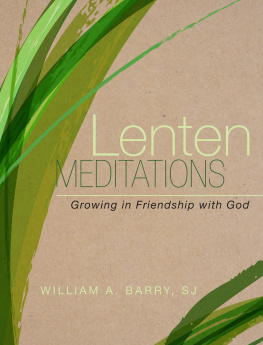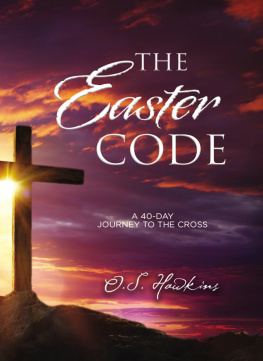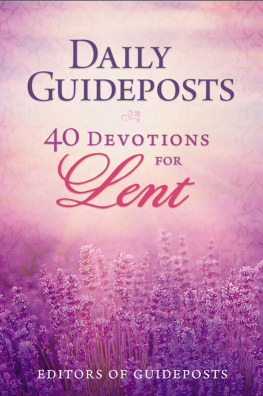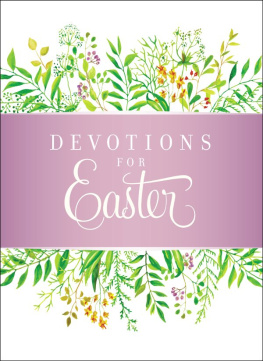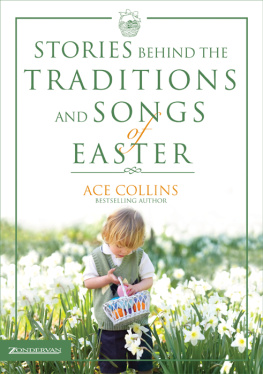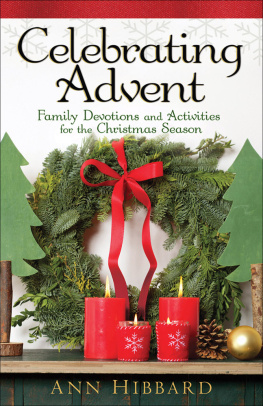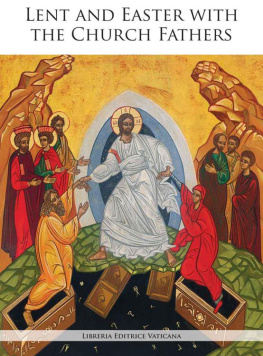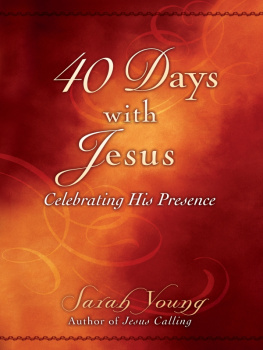

A Guide to the Customs and Devotions of Lent
and the Season of Christs Resurrection
Fr. William Saunders
TAN Books
Charlotte, North Carolina
Copyright 2020 Rev. William P. Saunders
All rights reserved. With the exception of short excerpts used in critical review, no part of this work may be reproduced, stored, or transmitted in any form whatsoever without the prior written permission of the publisher.
Excerpts from the English translation of the Catechism of the Catholic Church for use in the United States of America 1994, United States Catholic Conference, Inc. Libreria Editrice Vaticana. Used with permission.
All excerpts from papal homilies, messages, and encyclicals Copyright Libreria Editrice Vaticana. All rights reserved.
New Testament Scripture texts in this work are taken from the New American Bible, revised edition 2010, 1991, 1986, 1970 Confraternity of Christian Doctrine, Washington, D.C. and are used by permission of the copyright owner. All Rights Reserved. No part of the New American Bible may be reproduced in any form without permission in writing from the copyright owner.
Old Testament Scripture texts in this work are taken from the New American Bible, 1970 Confraternity of Christian Doctrine, Washington, D.C. and are used by permission of the copyright owner. All Rights Reserved. No part of the New American Bible may be reproduced in any form without permission in writing from the copyright owner.
Cover and interior design by Caroline K. Green
Library of Congress Control Number: 2019948696
ISBN: 978-1-5051-1421-8
Published in the United States by
TAN Books
PO Box 410487
Charlotte, NC 28241
www.TANBooks.com
Printed in the United States of America

To my dear mother,
Pauline C. Saunders,
whose favorite
holiday is Easter

Contents


Alleluia! Christ is risen! was the greeting of the early Christians to one another on Easter Sunday morning, to which the response would be, He is truly risen! Easter is the most solemn and joyful celebration of the Church year. We celebrate with renewed faith that our Lord Jesus Christ suffered, died, and rose for our salvation. The Lord Jesus has conquered sin, suffering, death, and evil itself. Christ has triumphed, and we will share in his victory if we remain faithful. As St. Paul said, If we have died with him / we shall also live with him; / if we persevere / we shall also reign with him (2 Tm 2:1112).
Unfortunately, Easter is overshadowed by our Christmas celebration. Perhaps it is because the Christmas marketing hype now begins in the fall, with the emphasis on gift giving and decorating. Instead of being a time of spiritual preparation, Advent has given way to parties and other celebrations. Since there seems to be more activity and excitement surrounding Christmas, the significance of Easter is lost for many people.
While Advent and Christmas focus on the birth of our Savior, Lent and Easter focus on our rebirth as children of God and members of the Church. Yes, Lent is a penitential season, but the lack of activitythe decorating, gift giving, and partyingis a great blessing. Lent provides the opportunity to focus on our relationship with the Lord Jesus and to grow spiritually through prayer, fasting, and sacrifice. Here is a time to open ourselves to abundant graces. If a person takes Lent seriously as a time of introspection and conversion, then Easter becomes a real celebration of a renewed faith in the love of God as shown us through our Savior, Jesus Christ.
Therefore, this book is meant to help individuals and families journey through Lent and to make it a time of spiritual renewal, and thereby to celebrate Easter as a rising to new life with the Lord. Then each of us can truly proclaim, Alleluia! Christ is risen! And he has risen in my life!




Shrovetide is the week preceding the beginning of Lent. The word itself, Shrovetide, is the English equivalent for the Italian Carnivale, which is derived from the Latin words carnem levare, meaning to take away the flesh. (Note that in Germany, this period is called Fasching, and in parts of the United States, particularly Louisiana, Mardi gras.) While this was seen as the last chance for merriment, and unfortunately in some places has resulted in excess and debauchery, Shrovetide was the time to cast off the things of the flesh and prepare spiritually for Lent.
Actually, the English term provides the best meaning for this period. To shrive meant to hear the confession of the penitent sinner; that is, in hearing a confession, the priest was shriving the sinner. In the Anglo-Saxon Ecclesiastical Institutes, recorded by Theodulphus and translated by Abbot Aelfric about AD 1000, Shrovetide was described as follows: In the week immediately before Lent everyone shall go to his confessor and confess his deeds and the confessor shall so shrive him as he then may hear by his deeds what he is to do in the way of penance. To highlight the point and motivate the people, special plays or masques were performed which portrayed the passion of our Lord or final judgment. Clearly, this Shrovetide preparation for Lent included the confessing of sin and the reception of absolution; as such, Lent then would become a time for penance and renewal of faith.
One last point: When carnivale or mardi gras became for some people a debauched party, the Church tried to restore the penitential nature of this time. In 1748, Pope Benedict XIV instituted the Forty Hours of Carnival, whereby prayers were offered and the Blessed Sacrament was exposed in churches during the three days preceding Ash Wednesday. In a letter entitled Super Bacchanalibus, he granted a plenary indulgence to anyone who adored the exposed Blessed Sacrament by offering prayers and making atonement for sins.
Shrove Tuesday and Pancakes
While the week of Shrovetide condoned the partaking of pleasures from which a person would abstain during Lent, Shrove Tuesday had a special significance in England. In the Middle Ages, people abstained from all forms of meat and animal products (although some areas allowed for food like fish). For example, Pope St. Gregory (d. 604), writing to St. Augustine of Canterbury, issued the following rule: We abstain from flesh, meat, and from all things that come from flesh, as milk, cheese, and eggs. So in England, pancakes were prepared and enjoyed because in so doing, a family depleted their eggs, milk, butter, and fat, all of which were part of the Lenten fast. Therefore, the eating of pancakes on Shrove Tuesday became a tradition. For this same reason, Easter was celebrated with decorated eggs and fresh breads.
Next page

